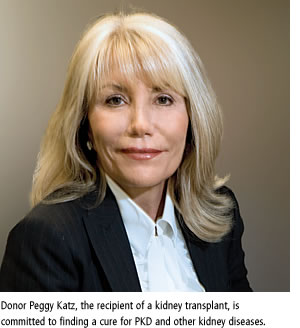 In its most common form, polycystic kidney disease (PKD) is basically a medical time bomb. The genetically spawned disease lies dormant through childhood, adolescence, and early adulthood before springing to life to fill the kidneys with debilitating cysts. In its most common form, polycystic kidney disease (PKD) is basically a medical time bomb. The genetically spawned disease lies dormant through childhood, adolescence, and early adulthood before springing to life to fill the kidneys with debilitating cysts.
Peggy Katz hadn’t reached 30 when PKD started the process of commandeering her kidney function. She had a pretty good idea what to expect given that her mother, Annabelle Payne, died from PKD complications. In addition, one of Katz’s six children has the disease.
It’s a familial legacy that prompted Katz and her husband, Harold Katz, to pledge $5 million to the Miller School’s Division of Nephrology and Hypertension to combat kidney illnesses. “The only way that we’re going to get to the bottom of polycystic kidney disease and other kidney diseases is to have the money for research,” says Katz.
The Boca Raton resident and her family have been touched by an autosomal dominant form of PKD, where both parents carry a gene that results in their child developing the disease. A rare variant is autosomal recessive PKD, which is triggered by a mutant gene and can cause death in utero or during the first month of life.
The autosomal dominant version put Annabelle Payne through an excruciating time for about nine years, until her death at the age of 60, Katz recalls of her mother. “She was on dialysis, and it affected her heart as well, which usually happens once you have kidney disease,” Katz remembers ruefully. “My mother lived for two years on dialysis, but her quality of life was not good.”
Intimately familiar with the havoc PKD can wreak, Katz had a feeling, an uncorroborated sense, that she’d been granted a reprieve. She was wrong. Katz was 29 when the truth was made clear. “I was pregnant, and I was having a very difficult time with bleeding, urinary infections, and so on,” Katz says matter-of-factly. “I had no energy, I was anemic, and I needed to rest all the time. And I was nauseous, so I couldn’t eat.”
Most would understand if Katz had decided to hold a pity party. Instead, she got mad. “I made up my mind that I was not going to be a victim,” she says. “I was going to live my life and take control.”
The recipient of a transplanted kidney five years ago, Katz is pleased to be in a position to push for a PKD cure.
“Peggy is not only a very compliant, excellent patient who takes fantastic care of herself, but she’s extremely well educated about her disease and is very involved on a national level with PKD fundraising and education,” says David Roth, M.D., medical director of kidney transplantation and clinical director of the Division of Nephrology and Hypertension.
What motivates Katz to do so much PKD-related work? “I am grateful to be alive,” she says simply. “And I am grateful to the University of Miami doctors and nurses who took care of me.”
|


